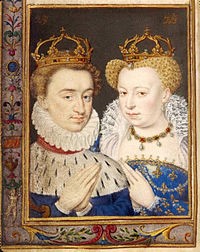The Conversion of Henri IV of France
Chapter 2 : Navarre
Henri de Bourbon was born at Pau on 13 December 1553.[1] His mother, Jeanne d’Albret, was a Huguenot. Henri’s father, Antoine de Bourbon, died in 1562, his mother in 1572 - bequeathing him her royal title, possessions and faith. [2]
Before the age of twenty, Navarre, as Henri was now known, governed a small patch of land which was the rump kingdom of Navarre but that was the least of his possessions. He was one of France’s territorial magnates with huge tracts in the south west, holding Béarn (as its Viscount), Foix (as its Count), Albret (as its Duke) and Bigorre (as its Count). He was also the first Prince of the Blood, which meant that he was the senior cousin of the ruling Valois.
The family connection was so far away, it was sublime. Catherine de Médicis said she was more closely related to Adam and Eve than to the King of Navarre. [3] The common ancestor, from whom the Valois and Navarre descended, was King Louis IX – St Louis – who died in 1270. Why did this minimal connection mean anything at all three hundred years later?
In France women could not inherit the throne, nor did the sons of a royal princess have royal rights.[4] This anti-woman provision kept France safe from foreign domination, since a foreign husband of a French queen regnant was bound (being a man) to dominate his wife (being a woman). In short France disempowered royal women to keep France French.
Navarre was the closest male line relative to the Valois kings. Consequently, after the death of Anjou, Navarre became heir to Henri III - the heir to France. From being an outlying member of the French royal family, he transformed - thanks to Anjou’s doctors, thanks to the many children of St Louis [5] - into a figure of European significance.
Navarre had king-like qualities. He was a soldier. He was universally affable if given to fits of anger. His political skills grew as the years passed. His provincial origins looked good by comparison with the refined court of Henri III whose childlessness was scornfully ascribed to homosexuality - the King of France was surrounded by handsome young men, his ‘ mignons.’
By contrast Navarre was dedicated to an endless pursuit of women. He was famously scruffy. When he went to Paris in 1572[6] to be married, Navarre’s mother told him to remember to brush his hair properly. She also wrote to his cousin, the Prince de Condé, saying that her son was not especially tall, but at least he was in love. [7] After 1572 he had the most glamorous and grandest wife in Europe, Marguerite de Valois, sister of Henri III.

But Navarre was a Huguenot. Worse, he was the ‘ Protector’ of the French Protestants, their leader in war. Could the Protector of the Huguenots become king? If he did, would he appoint the Catholic bishops who controlled the rich Gallican (French Catholic) Church? Could he be anointed king with the holy oil used to sanctify French kings since the time of Clovis, the first (fifth century!) King of the Franks? When Anjou died these questions moved to the top of the political agenda.
Of course there was the hope that Henri III and Queen Louise might yet have a son to keep the throne Catholic, but after nearly ten years of marriage there were no children at all. The mignons, the white hair of the king (thirty-three when Anjou died), and the sickly quality of the Valois brothers made it probable that Henri III would never have a son – that he would shortly join his dead brothers.
1584 was therefore a tipping point. When Navarre became heir to France, Guise and the League saw a Protestant king in waiting. The next phase in French civil war now started, the ‘ War of the Three Henris,’ so called after the first names of the King, the Duke of Guise, and the King of Navarre – a three-cornered war.
[1] Babelon Henri IV (Fayard 1982) pp 41-2
[2] Jeanne was queen regnant of Navarre
[3] Henry M Baird The Huguenots and Henry of Navarre (Wipf and Stock 2004) p 268
[4] The ancient Salic Law was cited, In fact it was an excuse for modern pragmatism.
[5] Navarre descended from Louis IX’s tenth child, Robert of Clermont
[6] His marriage led to the St Bartholomew’s Day massacre
[7] Babelon p 175














